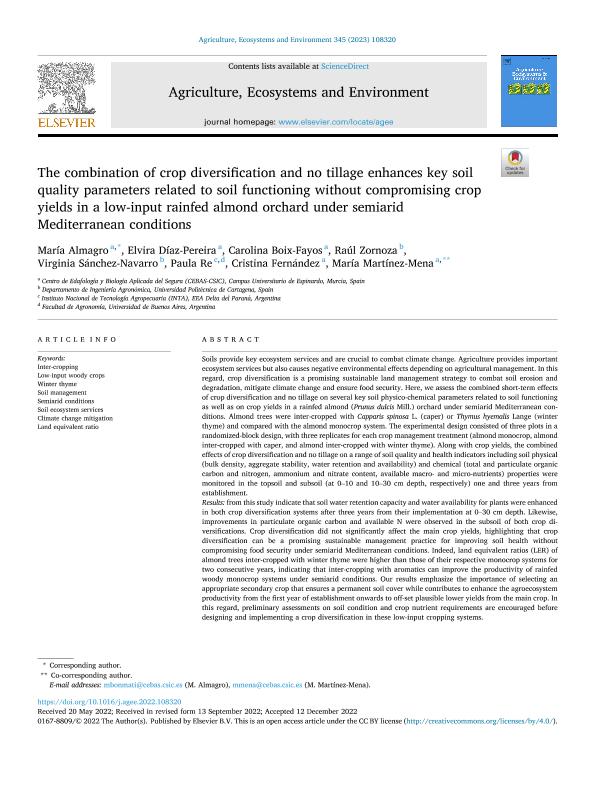Artículo
The combination of crop diversification and no tillage enhances key soil quality parameters related to soil functioning without compromising crop yields in a low-input rainfed almond orchard under semiarid Mediterranean conditions
Almagro, María; Díaz Pereira, Elvira; Boix Fayos, Carolina; Zornoza, Raúl; Sánchez Navarro, Virginia; Re, Paula ; Fernández, Cristina; Martínez, María Jimena
; Fernández, Cristina; Martínez, María Jimena
 ; Fernández, Cristina; Martínez, María Jimena
; Fernández, Cristina; Martínez, María Jimena
Fecha de publicación:
04/2023
Editorial:
Elsevier Science
Revista:
Agriculture, Ecosystems and Environment
ISSN:
0167-8809
Idioma:
Inglés
Tipo de recurso:
Artículo publicado
Clasificación temática:
Resumen
Soils provide key ecosystem services and are crucial to combat climate change. Agriculture provides important ecosystem services but also causes negative environmental effects depending on agricultural management. In this regard, crop diversification is a promising sustainable land management strategy to combat soil erosion and degradation, mitigate climate change and ensure food security. Here, we assess the combined short-term effects of crop diversification and no tillage on several key soil physico-chemical parameters related to soil functioning as well as on crop yields in a rainfed almond (Prunus dulcis Mill.) orchard under semiarid Mediterranean conditions. Almond trees were inter-cropped with Capparis spinosa L. (caper) or Thymus hyemalis Lange (winter thyme) and compared with the almond monocrop system. The experimental design consisted of three plots in a randomized-block design, with three replicates for each crop management treatment (almond monocrop, almond inter-cropped with caper, and almond inter-cropped with winter thyme). Along with crop yields, the combined effects of crop diversification and no tillage on a range of soil quality and health indicators including soil physical (bulk density, aggregate stability, water retention and availability) and chemical (total and particulate organic carbon and nitrogen, ammonium and nitrate content, available macro- and micro-nutrients) properties were monitored in the topsoil and subsoil (at 0–10 and 10–30 cm depth, respectively) one and three years from establishment. Results: from this study indicate that soil water retention capacity and water availability for plants were enhanced in both crop diversification systems after three years from their implementation at 0–30 cm depth. Likewise, improvements in particulate organic carbon and available N were observed in the subsoil of both crop diversifications. Crop diversification did not significantly affect the main crop yields, highlighting that crop diversification can be a promising sustainable management practice for improving soil health without compromising food security under semiarid Mediterranean conditions. Indeed, land equivalent ratios (LER) of almond trees inter-cropped with winter thyme were higher than those of their respective monocrop systems for two consecutive years, indicating that inter-cropping with aromatics can improve the productivity of rainfed woody monocrop systems under semiarid conditions. Our results emphasize the importance of selecting an appropriate secondary crop that ensures a permanent soil cover while contributes to enhance the agroecosystem productivity from the first year of establishment onwards to off-set plausible lower yields from the main crop. In this regard, preliminary assessments on soil condition and crop nutrient requirements are encouraged before designing and implementing a crop diversification in these low-input cropping systems. Likewise, long-term studies are needed to provide evidence on the stability of the production of diversified crop management, particularly in these low-input cropping systems under harsh environmental conditions.
Archivos asociados
Licencia
Identificadores
Colecciones
Articulos(SEDE CENTRAL)
Articulos de SEDE CENTRAL
Articulos de SEDE CENTRAL
Citación
Almagro, María; Díaz Pereira, Elvira; Boix Fayos, Carolina; Zornoza, Raúl; Sánchez Navarro, Virginia; et al.; The combination of crop diversification and no tillage enhances key soil quality parameters related to soil functioning without compromising crop yields in a low-input rainfed almond orchard under semiarid Mediterranean conditions; Elsevier Science; Agriculture, Ecosystems and Environment; 345; 108320; 4-2023; 1-10
Compartir
Altmétricas



